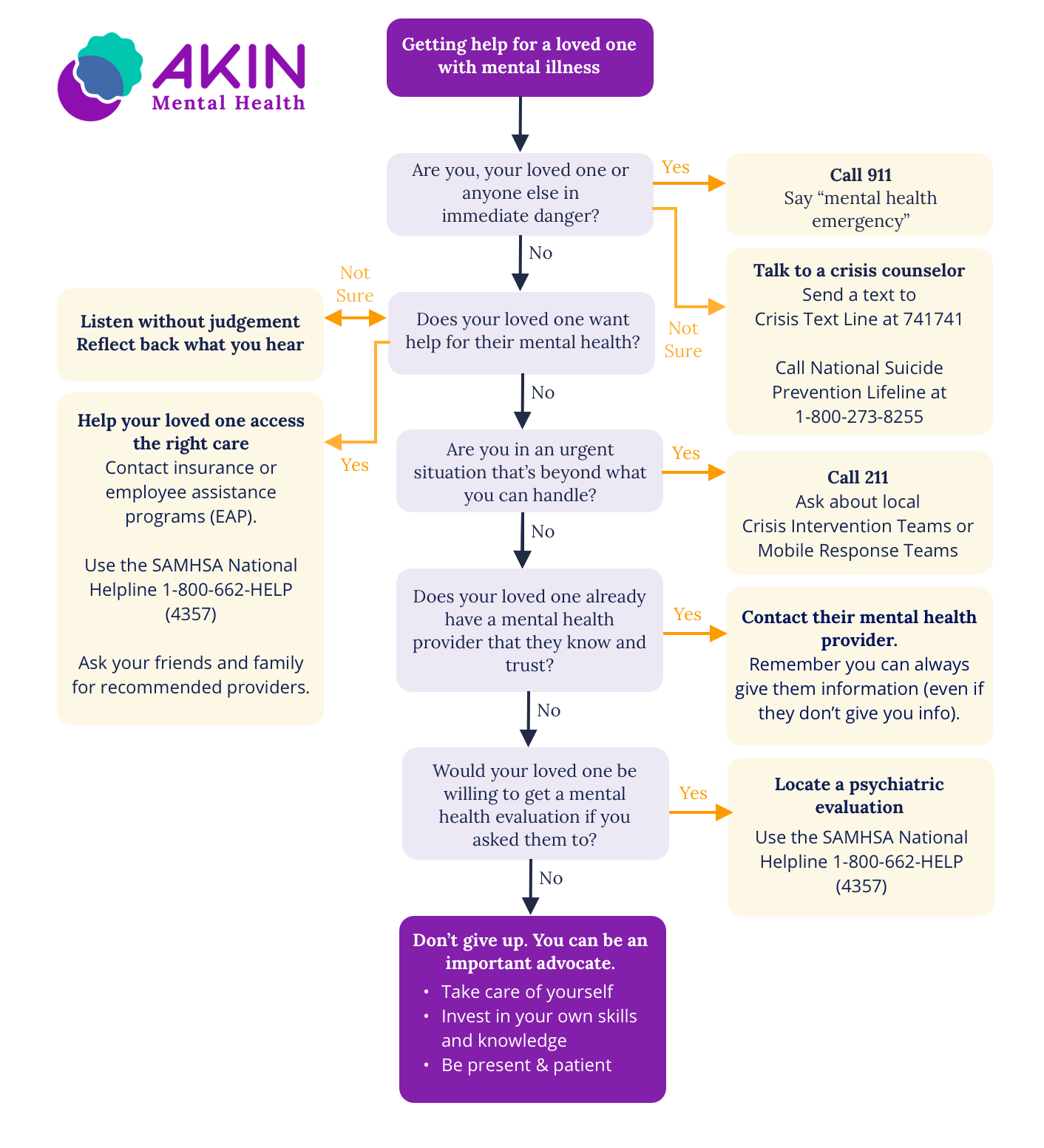It can be a scary situation when a loved one is struggling with severe mental illness, especially if they are refusing treatment. You understand that you’re out of your league and need help but it’s unclear what your options are because mental health resources are so difficult to navigate.
I have a family member with bipolar one disorder and knowing about the available mental health resources has helped me feel far more prepared to support my loved one in the event of an episode. In this article, I’ll help you understand which mental health services are available and appropriate to reach out to for help to support your loved one.


Emergency Services
If you or your loved one are in clear, immediate danger, the best option is to call 9-1-1. This will most likely lead to a police response so when you make the call be sure to mention that it is a “mental health emergency”. This way the first-responders have a sense of the situation that they are entering into. You can also ask for a Crisis Intervention Team. Crisis Intervention Teams include professionals specifically trained to handle mental health crises.
If you’re unsure whether you’re in a crisis situation or an urgent situation where there is not an immediate danger, you can call the National Suicide Prevention Lifeline at 800-273-8255. The crisis counselors on this line will help you walk through and assess your situation. These counselors can talk to you about any urgent situation involving mental health not just those specific to suicide.
Key resources:
- 9-1-1: mention “mental health emergency”
- Crisis Intervention Teams
- National Suicide Prevention Lifeline at 800-273-8255
Crisis Response Teams and Mobile Response Teams
Crisis and mobile response teams are professional teams that can come to your house the same day that you call and provide assessments and interventions for adults experiencing mental health crises. You can call 2-1-1 to discover whether these services or similar services are available in your area.
Key resources:
- Crisis or Mobile Response Team
- 2-1-1
Psychiatric Evaluation
If your loved one is willing, you can take them to a mental health professional so that they can get a psychiatric evaluation. You want to focus on your loved one’s “willingness” to have an evaluation not an “acceptance” of treatment.
You should not expect your loved one to have the same view of their symptoms that you do, so don’t focus on arguing about the need for treatment. Treatment is a long term choice, but an evaluation is a tool to empower both of you to handle the situation with more information. It’s ok to ask your loved one to attend an evaluation as a favor to you or because you feel that you need the help of an expert to better understand what they are experiencing. Focusing on your own needs rather than the behavior of your loved one can be a powerful way to reduce conflict and move forward productively.
Evaluations can happen in a hospital emergency room, a community mental health clinic, clinician’s office, or potentially through a tele-health provider. You’re looking for a professional who can quickly assess the situation and make recommendations or referrals to other types of treatment or facilities that might be helpful for your loved one. If you are unsure where to access a psychiatric evaluation you can call the SAMHSA helpline at 1-800-662-HELP (4357). The operators can help you access the right kind of providers.
Key resources:
- SAMHSA helpline at 1-800-662-HELP (4357)
- Emergency rooms
- Community mental health clinics
- Clinician’s office
- Telehealth providers
Existing Providers
If there’s already a provider that your loved one has seen before, that they know and trust, then this is really your best option. This can be a psychiatrist, therapist, or case manager.
Reach out to them, express your concerns, let them know that you’re worried about your loved one. A mental health professional that knows your loved one’s history is going to give the best options for moving forward. These providers may not give you information directly because of privacy laws. However, you can always give them information and this can help them advocate.
Key resources:
- Psychiatrist
- Therapist
- Case manager
Advocating for Treatment
Your loved one will have the best chance of recovery when they recognize the benefits of treatment for themselves. Recognizing the benefits of treatment, is not the same thing as “admitting they have a problem”, “hitting rock bottom” or “accepting their diagnosis”. If your loved one is not in a crisis situation or in need of urgent care, you are likely to find yourself becoming an advocate for treatment.
Advocating for treatment is much easier said than done. Advocacy is counter-intuitive because it always starts with listening (not telling). Some of the most common reasons that people do not engage in treatment for mental health problems are:
- Bad (or even traumatizing) experiences with previous treatment
- A symptom of psychosis called anosognosia (i.e. “lack of insight”) which blocks the ability for them to recognize their illness and symptoms
- Natural ambivalence about treatment or change
These reasons are valid even if you or others disagree. You may be surprised at how helpful it can be for you to listen and validate whatever reason your loved one has for not seeking care.
Conclusion
There are a number of resources available that you can reach out to when your loved one is in the midst of an episode and needs support. But identifying the best option to reach out to depends on the severity of the situation. I’m hopeful that this guide provides some insight into which services are appropriate for your family’s needs.
Remember, your loved one has the best chances of long-term recovery when they see benefits of treatment for themselves. But you, as a family member or friend, can have a massive impact towards helping your loved one on that path. Akin Mental Health is built specifically to support you with this - to help families navigate these incredibly challenging situations to support their loved ones over the long term.